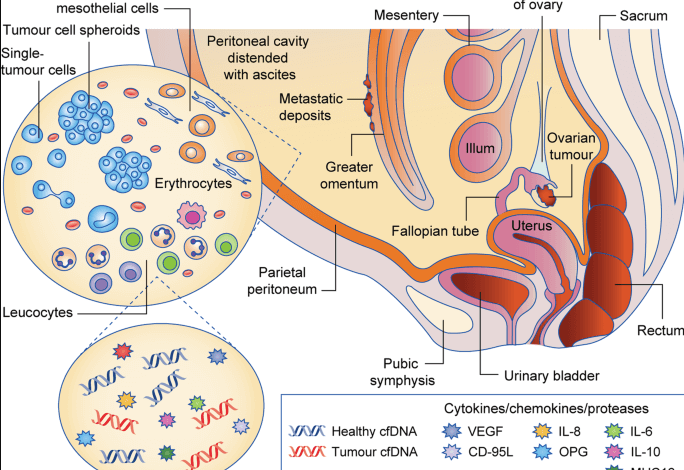The Link Between Ascites Ovarian Cancer: What You Need to Know

Are you familiar with ascites and ovarian cancer? These are two medical conditions that may not be as well-known as others, but they can have a significant impact on women’s health. In this blog post, we will explore what ascites ovarian cancer are, how they are related, and what symptoms to watch out for. So buckle up and read on to learn more about this important topic!
What is Ascites?
Ascites is a medical condition characterized by the accumulation of fluid in the abdominal cavity. This excess fluid can cause swelling and discomfort in the abdomen, which may lead to difficulty breathing and other complications.
There are several causes of ascites, including liver disease, heart failure, kidney disease, and cancer. When these underlying conditions affect the body’s ability to regulate fluids properly, it can result in an excessive buildup of fluid within the abdomen.
The symptoms of ascites vary depending on their severity. In mild cases, there may be no noticeable symptoms at all. However, as ascites progress to more severe stages, individuals may experience abdominal pain or discomfort as well as bloating or swelling around their midsections.
If you suspect that you have ascites or are experiencing any unusual symptoms related to your abdomen or digestive system generally; consult with a healthcare professional right away for proper diagnosis and treatment options available for your specific case.
What is Ovarian Cancer?
Ovarian cancer is a type of cancer that occurs when the cells in the ovaries begin to grow out of control. The ovaries are two small organs located on either side of the uterus, and they are responsible for producing eggs and hormones like estrogen and progesterone.
There are several different types of ovarian cancer, each with slightly different characteristics and treatment options.
Other types include germ-cell ovarian tumors (which start in egg-producing cells), stromal ovarian tumors (which arise from connective tissue within the ovary), and small-cell carcinoma of the ovary (a rare but aggressive form).
Symptoms can be vague and non-specific, including bloating, abdominal pain or discomfort, back pain, fatigue, indigestion or nausea. It’s important to note that these symptoms could also be caused by other conditions such as irritable bowel syndrome or menstrual cramps so it is always best to consult a healthcare professional if any concerns arise.
The Link Between Ascites Ovarian Cancer
It can be caused by various factors such as liver disease, heart failure, and cancer. However, one of its most common causes is ovarian cancer.
Ovarian cancer is often called the “silent killer” because it doesn’t always present obvious symptoms until it has progressed to an advanced stage. Ascites can be one of those early warning signs that something isn’t right with your body.
The link between ascites ovarian cancer lies in how cancer cells spread throughout the body. In this case, they can invade the peritoneum (the tissue lining the abdomen) and cause fluids to accumulate in response to inflammation or irritation.
If you have been diagnosed with ascites, especially if there’s no clear explanation for it like liver or heart problems, your doctor will likely order further tests to rule out any underlying conditions like ovarian cancer.
It’s crucial to note that not all cases of ascites are linked to ovarian cancer – but being aware of this potential connection can help you catch any issues early on when treatment options are more effective.
Symptoms of Ascites
It can be caused by various medical conditions, including ovarian cancer.
Symptoms of ascites include abdominal swelling or bloating, discomfort or pain in the abdomen, shortness of breath, and nausea or vomiting. In some cases, patients may also experience weight gain due to increased fluid retention.
Other symptoms that may indicate underlying ovarian cancer include persistent pelvic pain, changes in bowel habits such as constipation or diarrhea, frequent urination or urgency to urinate, and fatigue.
It’s important to note that these symptoms are not specific to ovarian cancer and can be indicative of other medical issues as well. However, if you’re experiencing any combination of these symptoms for an extended period of time (more than two weeks), it’s essential to schedule an appointment with your healthcare provider for further evaluation and testing.
Early detection is crucial when it comes to treating ovarian cancer effectively. So don’t hesitate to seek medical attention if you suspect there might be something wrong. Read more…
Conclusion
Ascites ovarian cancer are closely related conditions that can have serious implications for women’s health. While ascites is not always an indicator of cancer, it is important to seek medical attention if you experience symptoms such as abdominal swelling or discomfort.
If you have been diagnosed with ovarian cancer and are experiencing symptoms of ascites, your healthcare provider may recommend a variety of treatment options including chemotherapy, surgery, or drainage procedures.
By staying informed about the link between ascites and ovarian cancer and taking proactive steps to monitor your health, you can help ensure early detection and effective treatment. Remember: knowledge is power when it comes to your health!

